Both the Breville Duo Temp Pro vs Gaggia Classic Pro are two conviving entry-level espresso machines. If you already own an espresso-quality grinder, or if you’re inclined to purchase one separately, either of these machines would be a great addition to your coffee-making setup.
Comparing these two, the Gaggia Classic Pro is a less ideal choice for beginners than the Breville Duo Temp Pro. This one lacks PID control so you must be adept at temperature surfing to be good to go with it or it doesn’t come with an automatic pre-infusion feature, requiring you to perform this step manually, among others.
Breville Duo Temp Pro Vs Gaggia Classic Pro: Specs & Features Comparison Chart




Last update on 2025-04-06 / Affiliate links / Images from Amazon Product Advertising API
Breville Duo Temp Pro Vs Gaggia Classic Pro: Differences
The Duo Temp Pro won 4-2 against the Gaggia Classic Pro. Now let’s dive into my detailed comparison between these two entry-level machines!
Coffee Flavor & Brewing System
Winner: Breville Duo Temp Pro
Built-in Grinder
Both lack a built-in grinder, so you must buy and use a separate grinder or use pre-ground coffee and the pressurized basket. Before you think this is a deal-breaker, hear me out, owning a standalone grinder comes with some great benefits.
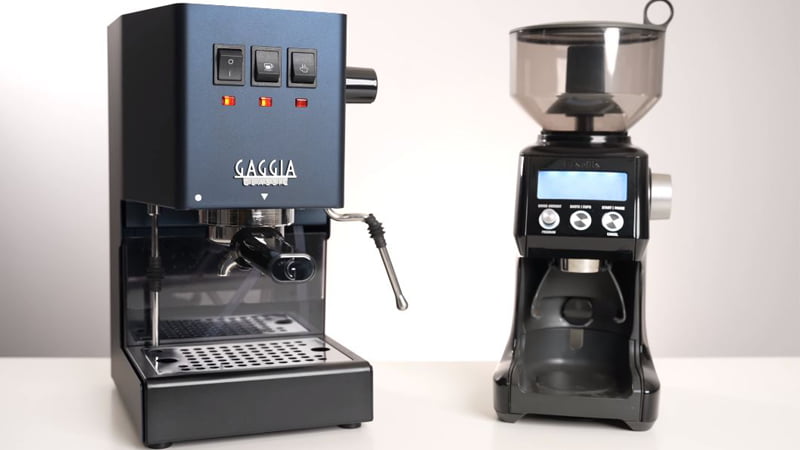
Standalone grinders typically offer more settings or greater precision in adjusting grind size compared to built-in grinders. This is crucial since the grind size can dramatically affect the quality and flavor of the shot. By comparison, many espresso all-in-ones only offer 5 or 6 grind settings, which is rubbish to me.
What’s more, with a standalone grinder, you can easily fix it (or the espresso machine itself) or upgrade to a higher-quality grinder without the need to overhaul your entire setup.
Of course, if you want to reduce the countertop footprint of your espresso setup, you could increase your budget slightly for an all-in-one unit like the Barista Express. It grinds your beans right into the portafilter, saving both money and counter space.
Dosing & Tamping
Both come with pressurized and non-pressurized filter baskets, four in total, and I’m just really pleased they’ve offered such flexibility. You might hear some seasoned baristas suggest ditching the pressurized baskets, but I don’t share that view. In my opinion, both types have their rightful place in your coffee-making arsenal.
Undoubtedly, you’ll get the best results with non-pressurized baskets, but I wouldn’t write off pressurized ones. They’re particularly forgiving when it comes to grinding size, which can be a real boon if you’re using pre-ground coffee or are still getting the hang of things.
And while I’m on the filter basket subject, I should mention the portafilter. The Duo Temp Pro comes with a well-made stainless steel 54mm portafilter, whereas the Classic Pro works with a 58mm portafilter that I often refer to as commercial-grade for good reasons.
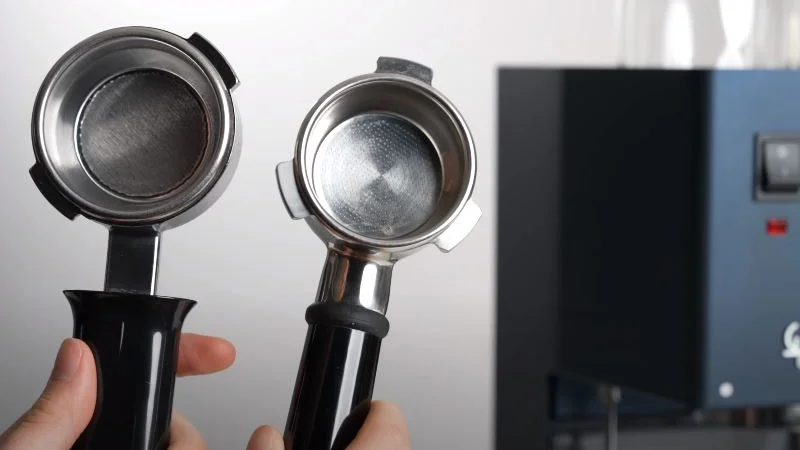
The Duo Temp Pro comes out of the box with a stainless steel tamper that conveniently attaches to the machine’s side with magnets. Its handle is plastic, but this is quite common for tampers included with machines, so I don’t see it as a deal-breaker.
On the other hand, the Classic Pro includes a disappointing flimsy plastic tamper, so I’d strongly suggest you consider upgrading to a stainless steel tamper to achieve more consistency and even better results in your espresso extraction.
Heating System
If the name “Duo Temp” conjures up images of a double boiler system, then sorry, I have to clarify that the Duo Temp Pro has only one boiler, and so does the Classic Pro. That means they can’t simultaneously pull a coffee shot and steam milk.
Despite the potential for misunderstanding its name, I’m quite fond of the Duo Temp Pro’s Thermocoil heating system. Sure, it doesn’t have the lightning-fast speed of ThermoJet, but it’s still significantly faster than a traditional boiler. Moreover, it initially heats up the group head and cup warmer, while ThermoJet only does that after a couple of shots.
On the other hand, the Classic Pro features an aluminum boiler encased in a sleek, durable stainless steel housing. Unlike many other machines, the Gaggia Classic Pro doesn’t have you waiting for 15 to 30 minutes for your first shot – it is ready for action in just about two to three minutes instead.
The biggest deal with the Classic Pro is probably that it has no PID controller like the Duo Temp Pro. This is ok if you are proficient in temperature surfing, but if you aren’t, it can be a pain in the ass.
Brewing System
Pre-infusion is what you’ll find on most Breville espresso machines, so I’m not surprised to see it once again with the Duo Temp Pro. This works by gently soaking the coffee grounds with water before the full brewing process begins, enhancing the extraction and leading to a richer, more flavorful espresso.
The Classic Pro doesn’t technically offer pre-infusion, but you can still moisten the puck for a few seconds by slightly opening the steam wand knob and pressing the brew button, then closing the steam wand shortly after. Just one more reason for a beginner to stay away from this machine.
A distinct advantage the Classic Pro holds over the Duo Temp Pro is its inclusion of a three-way solenoid valve, which removes pressure from the group head immediately after brewing. That way, when you detach the portafilter right after pulling a shot, you’re greeted with a neat, dry puck rather than a messy, wet one.
Design & Convenience
Winner: Breville Duo Temp Pro
Dimensions & User Interface
| Breville Duo Temp Pro | Gaggia Classic Pro | |
|---|---|---|
| Dimensions | 10 x 12.6 x 12.6 inches | 8 x 9.5 x 14.2 inches |
| Weight | 18.2 lbs | 18.7 lbs |
The Duo Temp Pro and Gaggia Classic Pro are both considered entry-level machines, but they are far from being cheap or flimsy. The majority of each machine’s casing is crafted from brushed stainless steel, lending them both durability and a timeless aesthetic appeal. They also won’t dominate your countertop space, but you’ll need to allocate some additional room for a stand-alone grinder.
Both have a simple user interface. All the complicated things about these semi-automatic machines are lying underneath their stainless steel housing. Sure, it’s nice that you don’t have to spend hours poring your nose into the user manual.
On the front of the Duo Temp Pro, there’s a power button on the side, a prominent dial in the center, and a button for selecting either steam or hot water. That dial is for switching between brewing and steaming, which also doubles as a dispenser for hot water.
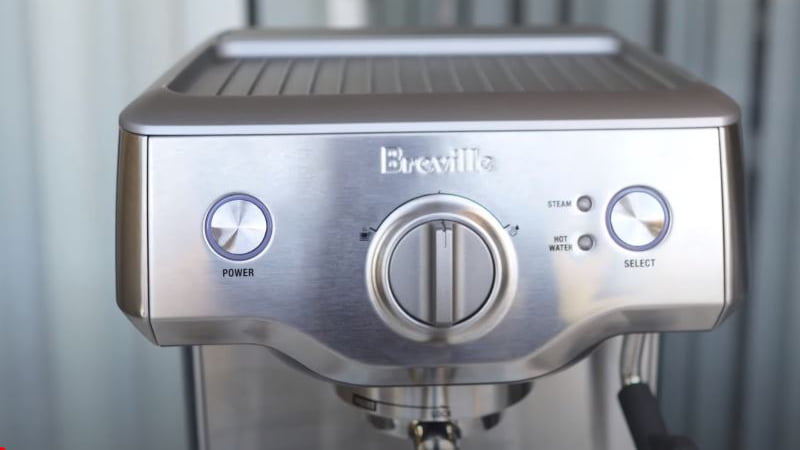
As for the Classic Pro, there are three switches, including one for power, another for brewing, and a third for steaming. Additionally, there are clear indicator lights to show when the machine is powered up, done preheating, or ready to steam. There’s also a big knob on the side for operating the wand.
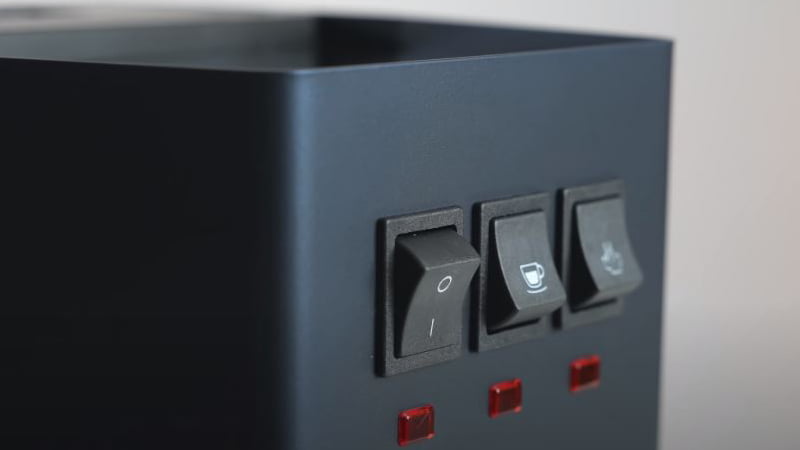
Spout Type & Cup Clearance
| Breville Duo Temp Pro | Gaggia Classic Pro | |
|---|---|---|
| Spout Type | Dual | Dual |
| Cup Clearance | 4.5 inches | 3.3 inches |
The Duo Temp Pro doesn’t have an adjustable spout, but it still offers ample space to accommodate espresso cups of various sizes. And if you find yourself needing to fit a larger travel mug, you can easily create more space by removing the drip tray.
As for the Classic Pro, this one doesn’t provide quite as much room as the Duo Temp Pro. But once again, you can remove the drip tray grille to accommodate larger cups or mugs.
Oh, in terms of cups, both machines come equipped with a passive cup warmer located right atop the heating systems. This type isn’t as effective as an active cup warmer, of course, but it still saves you the time and effort of manually pre-heating your cups or glasses.ư
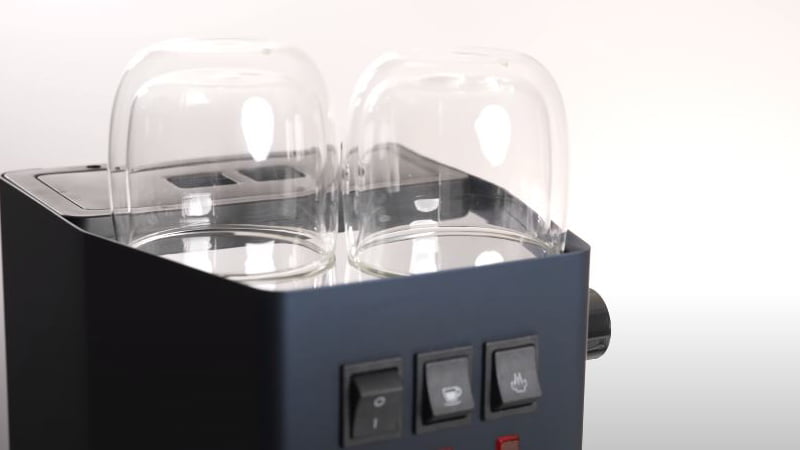
Water Reservoir & Bean Hopper
| Breville Duo Temp Pro | Gaggia Classic Pro | |
|---|---|---|
| Water Reservoir | 1.8 liters | 2.1 liters |
| Bean Hopper | N/A | N/A |
Despite the compact footprint, the Classic Pro features a good-sized removable water reservoir. It holds enough water for a substantial number of espresso shots before needing to be refilled. Removing it can be a bit tricky, but you can just refill it directly from the top of the machine.
The water tank of the Duo Temp Pro is slightly smaller in comparison, yet it remains impressively adequate for a space-saving machine. It attaches to the back of the machine and has a handle at the top for easy handling. This one also comes with a water filter, which not only helps prolong the lifespan of your machine but also reduces the frequency of descaling.
Milk Frothing System
Winner: Tie
These machines seem to take on most of the heavy lifting in espresso making, but they are still equipped with manual steam wands. Just clears all the things up, they require you to steam milk manually, but that’s the best way to create the dense microfoam that you’d typically find in coffee shops.
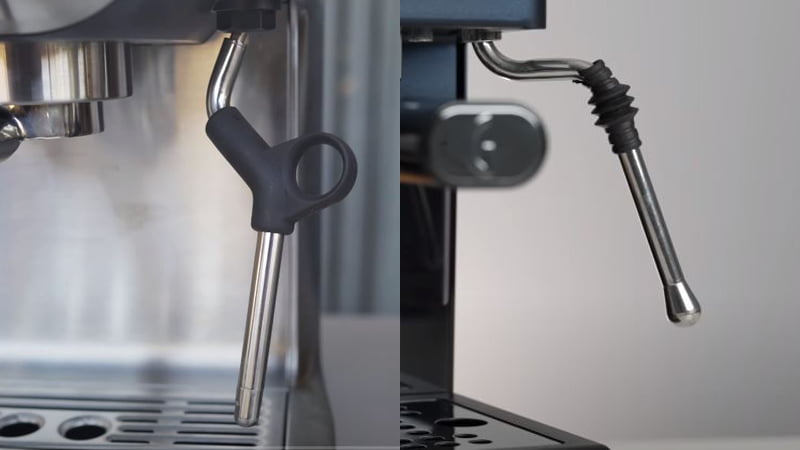
The Breville Duo Temp Pro boasts a professional single-hole steam wand with 360-degree swivel action, allowing you to easily find the perfect angle in your milk pitcher. This also means you can direct the wand over the drip tray after steaming, preventing any stray drips from landing on your kitchen counter.
On the other hand, the steam wand on the Classic Pro is not mounted on a ball joint, which limits its movement somewhat. But it is really powerful and can steam milk in just about 27 seconds, compared to the Duo Temp Pro’s 57 seconds. You will also need to separately purchase a stainless steel jug to go with it, while the Duo Temp Pro conveniently includes one in the package.
Drink Options & Programmability
Winner: Tie
Drink Options
| Breville Duo Temp Pro | Gaggia Classic Pro |
|---|---|
| Espresso Hot Water | Espresso Hot Water |
As is typical with most semi-automatic espresso machines, these models don’t offer one-touch options for specialty drinks, so you will need to go extra miles to make milk-based coffee drinks.
For example, to make a latte or cappuccino, you’ll need to steam the milk yourself using the machine’s steam wand. Or for an Americano or long black, you’ll need to add hot water to espresso.
It’s worth noting that the Classic Pro features a separate spout for dispensing hot water, while the Duo Temp Pro provides hot water through its steam wand. Having a dedicated outlet for this purpose is always more convenient and preferable.
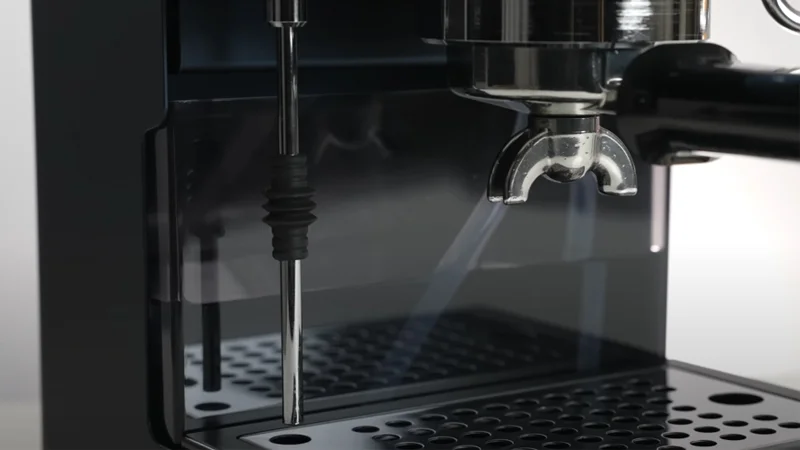
Programmability
| Adjustable Settings | Breville Duo Temp Pro | Gaggia Classic Pro |
|---|---|---|
| Coffee Strength | No | No |
| Coffee Temperature | No | No |
| Milk Foam Temperature | No | No |
| Milk Foam Texture | No | No |
Both only allow you to manually control shot volume, and that is all. I understand that the inability to adjust the brewing temperature might be a disappointment for some home baristas, but it could be considered a perk for newbies. These machines do all the work for you, so it’s one less step to do.
Quick Rundown Of Breville Duo Temp Pro
- The Breville Duo Temp Pro lets you create third wave specialty coffee at home; This espresso machine ensures balanced flavors from even extraction using low pressure pre-fusion, managing sweetness, acidity and bitterness for the perfect cup every time
- PRECISE ESPRESSO EXTRACTION: Low pressure pre-infusion helps ensure all the flavors are drawn out evenly during the extraction for a balanced tasting cup
- WATER TEMPERATURE: The 1600W Thermocoil–Integrated stainless steel water path accurately controls water temperature
- MANUAL MICROFOAM MILK TEXTURING: A high power 1600W element delivers sufficient steam to create microfoam that enhances flavor and enables you to produce latte art at home
- AUTO PURGE: The Duo-Temp Pro Espresso Machine automatically purges the heat system after steaming, ensuring your next espresso is extracted at the right temperature
Last update on 2025-04-06 / Affiliate links / Images from Amazon Product Advertising API
Quick Rundown Of Gaggia Classic Pro
- Solid Steel Housing, Made in Italy
- 9 Bar Espresso Extractions
- Stainless Steel 58mm Commercial Portafilter
- Commercial Three Way Solenoid Valve
- Commercial Steam Wand
Last update on 2025-04-06 / Affiliate links / Images from Amazon Product Advertising API
Product Videos
Related Articles to Breville Duo Temp Pro
- Delonghi Dedica Deluxe vs Breville Duo Temp Pro: What Is The Most Worth Buying Entry-level Espresso Machine?
- Breville Duo Temp Pro Vs Gaggia Classic: Which Machine Is Easier To Operate And Brews Better Coffee?
- Breville Duo Temp Pro Vs Bambino Review: A Breville Espresso Machine Comparison
- Breville Duo Temp Pro vs Infuser: Which Espresso Machine Performs Better?
- Breville Duo Temp Pro vs Barista Express: Which Is Better Breville Espresso Machine?
- Breville Cafe Roma Vs Duo Temp Pro: Which One Wins the Crown?
Related Articles to Gaggia Classic Pro
- Gaggia Classic Pro Vs Rancilio Silvia: Detailed Review & Comparison
- Gaggia Classic Pro Vs Quickmill 820: Top 4 Differences Between 2 Classic Espresso Machines
- Flair Pro 2 Vs Gaggia Classic Pro: Comparing 4 Crucial Aspects Of 2 Espresso Machines. Peculiar Vs Classic!
- Flair 58 Vs Gaggia Classic Pro: 1 Classic And 1 Alternative Espresso Machine. Which One Do I Prefer More?
- Rancilio Silvia M Vs Gaggia Classic Pro: 2 Straightforward Espresso Machines With Good Feedbacks. Are They For Real?
- Lelit Anna 2 Vs Gaggia Classic Pro: 2 Straightforward Espresso Machines For Beginners. Which Brews Better Coffees?
- Gaggia Classic Vs Gaggia Classic Pro: What Are The Differences?
- Lelit Anna Vs Gaggia Classic Pro: Reviewing 2 Affordable Espresso Machines For Offices. Which Is More Worth To Buy?
- Gaggia Classic vs Pro: What Is The Most Iconic Semi-Professional Espresso Machine Under $500?
- Breville Bambino Plus Vs Gaggia Classic Pro: Which One Is Better?
- Breville Infuser Vs Gaggia Classic Pro: Which One Is Best For You?
- Breville Bambino Vs Gaggia Classic Pro: A Head-To-Head Comparison
- Breville Barista Express vs Gaggia Classic Pro: Which Is Better Innovation?
- Gaggia Brera vs Classic Pro – What Is The Best Automatic Espresso Machine?
- Gaggia Carezza Deluxe vs Classic Pro: Which Is Best For You?
References
- Breville Duo Temp Pro: https://www.breville.com/us/en/products/espresso/bes810.html
- Gaggia Classic Pro: https://www.gaggia-na.com/products/gaggia-classic-pro

Felix Hendricks is a skilled barista with over 12 years of experience. He excels in crafting coffee and has a strong foundation in coffee machine mechanics. Felix holds a Coffee Machine Maintenance Certification from the Coffee Equipment Technical Institute, showcasing his ability to diagnose and repair coffee machines. He’s also worked as a quality control specialist, selecting premium coffee beans for optimal flavor. Felix has a diverse work history, including stints at renowned coffee spots like Café Euphoria & Starbucks. His expertise in both brewing and machine maintenance makes him a respected figure in the coffee industry.
